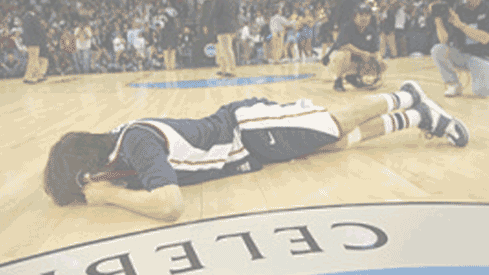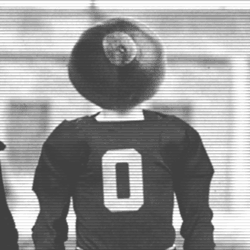Mods -- I posted this in one of the M threads and it is getting a lot of attention. I figured this specific discussion warranted its own thread. If you disagree go ahead and nuke this.
Summary -- The Big Ten suspended Juwan Howard under its sportsmanship policy just one day after the game that he punched Wisconsin's coach. This complied with B1G rules and constituted sufficient due process. This sets a precedent that UM cannot argue "due process" violations because of the expedience of the investigation, and thus cannot succeed in a TRO.
Background -- I've been practicing for 10 years. I've had two TRO cases this summer and won one and lost one. They are not complicated.
TRO Standard -- Under Michigan law, the standard for granting a TRO has four elements: "(1) the likelihood that the party seeking the injunction will prevail on the merits, (2) the danger that the party seeking the injunction will suffer irreparable harm if the injunction is not issued, (3) the risk that the party seeking the injunction would be harmed more by the absence of an injunction than the opposing party would be by the granting of the relief, and (4) the harm to the public interest if the injunction is issued. Davis v City of Detroit Financial Review Team, 296 Mich App 568, 612; 821 NW2d 896 (2012).
If you want a bit more detail there is a good thread on MGoBlog from a commercial litigator highlighting the standard. You can read it here -- https://mgoblog.com/mgoboard/primer-emergency-injunctive-relief
By far the hardest thing for Michigan to prove will be the first element -- the likelihood of success on the merits.
"Success on the merits" means exactly what it sounds like -- you have to prove you will win this case. You have to prove that you have the goods right out of the gate. Contrary to what people are saying, getting a TRO is not a stall tactic -- Michigan can't have a crappy case, somehow get a TRO, and then dismiss after January. It has to go in right away and prove "we will win, and here's why."
That is an extremely difficult burden. It is generally met in noncompete cases where a former employee went to a competitor, and you have emails of them soliciting your own customers. In that case you have a clear breach of contract, you will win once you get to the end of the case, you get your injunctive relief, and the only issue you have is how much damages will be awarded.
As the UM poster concedes, the biggest issue is whether UM will be able to prove whether it will be successful on the merits:
I think the latter 3 factors will all heavily weigh in favor of UM. The key is showing that UM is likely to prove its claim. So what is the claim? The B1G is acting in contravention of its own rules, so it's a breach of contract claim? So it comes down to the power of the B1G to do whatever it is about to do. Remember, B1G is a private organization. It has discretion to make "business" decisions--even if they are bad ones--like any other company (GM, Ford, Amazon, etc.). That UM doesn't like the decision or would have made a different one is not a basis to challenge it... if the B1G had power to make that decision.
Michigan's Argument -- Based on the above, Michigan will have to prove that the Big Ten has violated its procedures in order to get a TRO. According to the Big Ten Sportsmanship Policy:
10.2.1 ... The Commissioner shall have the exclusive authority to determine whether an offensive action ... has been committed
10.2.2 ... In the event the Commissioner determines that an offensive action has occurred, the Commissioner shall have the authority to impose any disciplinary action in response to the offensive action ...
10.3.1 ... In the event the Commissioner decides to pursue such an investigation, the Commissioner shall commence the investigation as expeditiously as possible ... The timeframe within which an institution or individual shall provide its or his or her position shall be set by the Commissioner, and shall be reasonable in light of the circumstances. Upon determination that an offensive action did occur, the Commissioner shall, as expeditiously as possible, determine whether disciplinary action should be imposed, and if so, what it should be.
Where is the "There" There? -- In summary, the Big Ten Commissioner has the "exclusive authority" to determine whether an offensive action occurred, he has the authority to impose "any disciplinary action" (subject to 10.3.1), he shall commence the investigation and determine whether an offensive action occurred "as expeditiously as possible," and it gives him the discretion to set the timeframe of the investigation. Rule 10.3.2 requires notice, which apparently the B1G did yesterday.
Needless to say this is incredibly broad discretion. Where is UM's argument that the B1G hasn't followed this policy? I just don't see it.
The Juwan Howard Precedent. For those of you that forgot, Juwan Howard punched a Wisconsin coach in the face after a game last year. He was suspended for five games the very next day under the Big Ten's sportsmanship policy:
Michigan men's basketball coach Juwan Howard has been suspended five games -- the remainder of the regular season -- and fined $40,000 for hitting Wisconsin assistant coach Joe Krabbenhoft in the face after Sunday's game, the Big Ten Conference announced on Monday.
Michigan forwards Terrance Williams and Moussa Diabate and Wisconsin guard Jahcobi Neath were each suspended one game. All three appeared to throw punches. The disciplinary actions were imposed by the Big Ten, in conjunction with both schools.
"Big Ten Conference coaches and student-athletes are expected to display the highest level of sportsmanship conduct," conference commissioner Kevin Warren said in a statement.
Obviously this case is a bit different, but I highlight the Howard incident to show that sometimes, in urgent circumstances, a "reasonable" timeline can be less than a single day. Here the B1G has provided UM with 48 hours to respond.
Michigan's Due Process Argument Won't Win. In sum, Michigan has set a precedent where a one-day investigation of its head coach constituted sufficient due process. This complied with the above policy -- the Commissioner deemed an offensive action occurred, he determined that just one day was a reasonable timeline, and he imposed a five game suspension.
The fact that Michigan is contesting a Harbaugh suspension doesn't change the Big Ten's rules, which again provide for the Commissioner's incredibly broad discretion. The Big Ten is following its policies to the letter. I can't see a path for Michigan getting a TRO.
QED.

